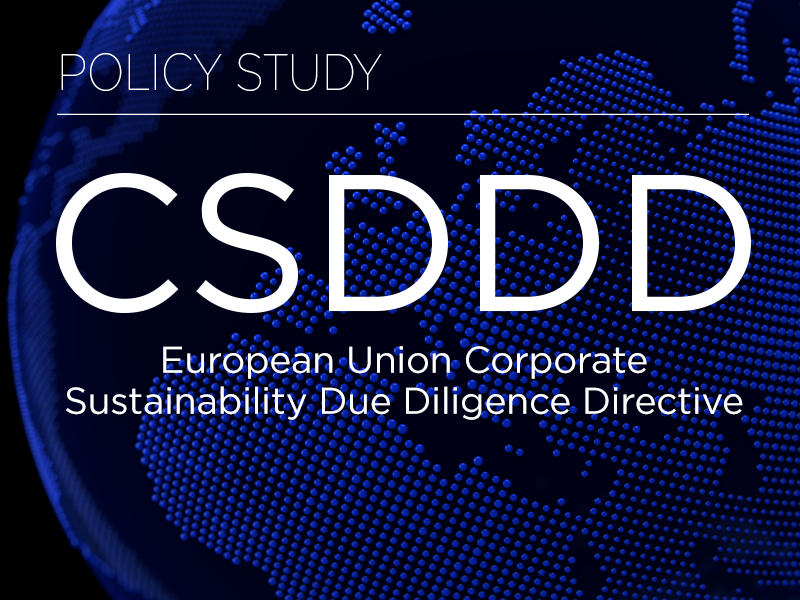Our Mission: To discover, develop, and promote free-market solutions to social and economic problems.
To stay up to date on all of our work, join our mailing list.

CSDDD: The European Union’s Corporate Sustainability Due Diligence Directive Is a Direct Threat to U.S. Sovereignty, Free Markets, and Individual Liberty
The radical environmental, social, and governance (ESG) movement has recently experienced substantial setbacks in the United States. However, ESG is far from dead. In fact, it will soon be imposed on America by the European Union.
On May 24, 2024, the European Union (EU) officially adopted the Corporate Sustainability Due Diligence Directive (CSDDD), after several years of development and intense deliberation. Upon its publication in the Official Journal of the European Union on July 5, 2024, the CSDDD entered into full force and effect on July 25, 2024.
It is not hyperbolic to say the CSDDD is one of the most economically restrictive and nakedly authoritarian laws in the history of western democratic civilization. The directive attempts to globally institutionalize sweeping ESG objectives by mandating practices for large companies doing business in the European Union, regardless of whether those companies are headquartered in the EU. Even worse, the CSDDD forces those companies to impose the same standards on many of the businesses operating within their global supply chains— fundamentally transforming all social and economic activity around the world. It is one of the gravest threats to freedom that Americans face today.
EU policymakers deliberately designed the CSDDD to change business practices around the world, rather than only within the jurisdiction of EU member states. This is not speculative; it is a commonly known fact about the CSDDD that has been confirmed by scholars across the ideological spectrum.
For example, professors Rachel Chambers and David Birchall explained in an analysis of the CSDDD published in 2024 by the UC Law Business Journal, “[The CSDDD] is designed to be extraterritorial. The aim is to compel companies based within a jurisdiction to comply with human rights rules that are generally well enforced within that jurisdiction throughout its global operations. Extraterritoriality is very much the point.”
All 27 member states of the European Union are required to transpose the CSDDD into their national laws by July 26, 2026. EU countries will then be individually responsible for enforcing those laws. The CSDDD can best be understood as the regulatory floor to which EU member states must adhere during transposition, though they can make the obligations more severe if they choose, as will be referenced later in this paper. Companies within the CSDDD’s direct scope will be forced to adhere to the CSDDD in various phases, with the largest companies having to comply by July 26, 2027. By July 26, 2029, all affected companies will have been phased in.
By nature, the CSDDD is a direct assault on U.S. sovereignty and the liberties of American citizens. Yet, it poses significant economic problems as well. The CSDDD requires companies to change large parts of their operations, often in ways that are likely to drive up costs. For example, the CSDDD mandates companies align their practices with the Paris Climate Agreement, curtail water and land consumption, reduce and reverse biodiversity loss, and eventually eliminate their use of fossil fuels, among many other stipulations. All these actions come with substantial economic costs that will be passed on to consumers in the United States, Europe, and around the world, making the CSDDD one of the most economically harmful laws ever passed.
If left unchecked, the CSDDD will eviscerate U.S. sovereignty, free markets, and individual liberty, replacing those ideals with a new system of global corporatism designed and enforced by elites in Brussels.
